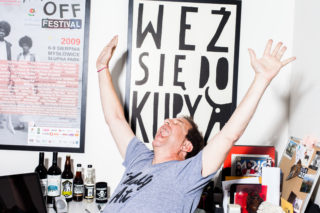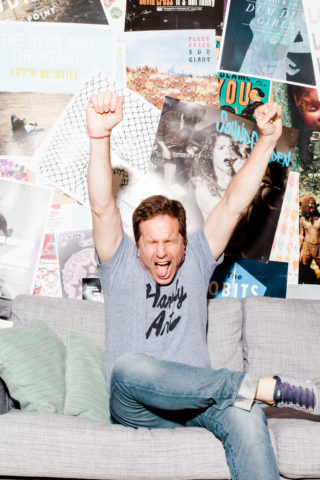Record Heads: Look how happy Sub Pop co-founder Jonathan Poneman looks
With its origins in a late ’70s fanzine and subsequent cassette tape series, no label is more synonymous with its hometown than Seattle’s Sub Pop

With its origins in a late ’70s fanzine and subsequent cassette tape series, no label is more synonymous with its hometown than Seattle’s Sub Pop
An hour with Jonathan Poneman leaves me black and blue. I’ve been reprimanded on my questioning (“What are you getting at here, you’re talking about grunge right?”); I’ve been encouraged to seize the day (“I’m super healthy apart from my Parkinson’s disease, I figure I could get hit by a car before I get hit by anything else”). Yet despite Poneman’s intensity, when we say our goodbyes I realise a grin has been present all along. A Chevy Chase-like dryness falls from every sentence Poneman constructs, including the first time the chief of Sub Pop Records opens his mouth to speak to me. “Well, to be held on a par with our peers is flattering enough, but to be seen as the quintessential American indie label is almost too much to bear. That’s OK though,” he explains slowly, “I will deal with it.”
Poneman has been dealing with Sub Pop for around a quarter of a century. Along with his friend and co-founder Bruce Pavitt he transformed this little label from Seattle into a self-proclaimed “medium sized label, still from Seattle.” It’s a joy to listen to the 55-year old discuss his business so wholeheartedly.
“Well, the genesis is that Sub Pop actually began in the late ’70s as a fanzine published by Bruce and there were two records released under the Sub Pop label before I even got involved. We celebrate our anniversary based on April 1st 1988 and the reason for this was because that was the point that Bruce and I went into this on a full time basis, rather than y’know whenever.” Poneman stops again; most of his sentences have long pauses. “April Fools day seemed to be a date that was suitable for celebrating Sub Pop records.” Most of his pauses work to good effect.
The two friends responsible for such seminal acts as Nirvana and Soundgarden set out to focus on a scene that existed outside of the national grid; inside Seattle was their inspiration. “Bruce and I really had an intention to focus and make an effort in that. Bruce is now a friend of the label but he is not involved in any capacity anymore, his philosophies, though, still apply to how we function and we are very proud of our region.”
Just hearing Poneman talk about his hometown is humbling; the roots of Sub Pop and the label’s location resonate in every release. “There is a great legacy of artists coming from this region and there is a, what’s the word, sorry I am not having a particularly articulate day, there is a catalogue, I guess – there is another word I am sure and it’ll come to me – but yes, a catalogue of records from this region that make up a body of work and continues to have a meaningful impact on the culture at large.”
No band had a bigger impact than Nirvana and, credited with creating a genre in grunge, whether they like it or not, no label had more sway at the time of ‘Nevermind’ than Sub Pop, even if the band had moved to Geffen for their monster hit record. We pussyfoot around this with Poneman for much longer than necessary before a prickly reply stops us short. “The thing is, that word had been used to describe raucous rock and roll long before myself and Bruce got into the record business. We didn’t do anything other than market and promote Nirvana and the other bands who were playing this kind of music in this region, at a very critical time. You know Sam Phillips didn’t create Elvis Presley, he didn’t create rock’n’roll; he was simply an impresario and an entrepreneur. That’s what Bruce and I did – we didn’t really create anything, except the company, which served as the platform for you know, advancing these careers. We also helped shape the context – I mean, I’m continuing to do that through all my conversations, like talking to you now for instance.”

For a brief moment I get the feeling Poneman would rather not be talking but the moments passes. We get back on to Seattle and the conversation flies once again. “I don’t want to get all Kumbayah and falsely paint Seattle as some kind of utopian colony because it most certainly isn’t, but it is a very dynamic and cooperative, focused community, and it’s one that has a lot of very obvious influence on the world at large; not necessarily its artists but with its entrepreneurial culture, be it companies like Sub Pop, or companies like Amazon and Microsoft. Obviously, we are on the low end of this scale, but these are all businesses that start off with an idea and an ambition and move forward to its realisation by staying in Seattle and being true to our region. So a significant part of Sub Pop’s success, while we release records from bands all over the world, is our relationship with our hometown, it’s something I don’t think can be overstated.”
Poneman mentioned Microsoft before we did. Even Bill Gates’ multinational software company has a place in the Sub Pop story. The corporation offered $4 million for the label in 1994 in an attempt to “be a bit more hip” (Dana Giacchetto’s words, not mine – the Sub Pop label associate who is claimed to be the inspiration for Leonardo Di Caprio’s character in recent film The Wolf of Wall Street). Gates’ bid apparently insulted the high-flying lawyer who also revealed that Geffen bid 8, Sony 5 and Universal topped the lot with 25 million dollars. Poneman went with Warners for 20 – not bad going for a niche label that began selling fanzines. It was a deal, though, that ended a partnership. The story goes that Poneman pushed for it as Pavitt pulled away. “The funny thing is…” [another dramatic long pause] “… is that it is actually the other way around. Bruce, I believe, was very interested in getting a payday because he had a young family. He got tired of coming to work and I don’t mean to suggest that he didn’t love the label, he really did, but we had a real struggle for the first few years. It wasn’t just a struggle as in starting a business struggle; we had the heartache of having bands move on to other labels. The thing about being in an independent label, particularly one that’s a start up, is that you have relationships with these people that become your friends, you party with them, you work with them and then suddenly when the issue comes where there is a cheque bigger than the one that you can write, their loyalty seems to move on. So Bruce found that particularly disappointing and I can understand that. It was not something that I thought was very pleasant but I always had a feeling that talent comes and talent moves on and if you love what you do and want to have a career in it you can’t be too married to one artist for reasons of sustaining your business – there are always going to be more artists, y’know? Bruce was over it and so we had the opportunity to sell a portion of the company where we could maintain control and get a sizeable payday. I think where your understanding is coming from is that I felt once we were in the relationship I didn’t want to go away, I didn’t want to retire and play golf or raise a family, all of which are fine pursuits and past-times, respectively! I was interested in taking these resources and maintaining this new relationship. Hopefully having the resources and muscle that a large label would have but still having community orientation and the cultural understanding that more intimate labels have; labels that are more closely aligned with their communities and the culture that the communities represent.”
I tell Poneman that with Sub Pop he seems to have achieved his goal. I believe that, but I’m not convinced Poneman believes I believe it. “Well thank you,” he says, “but we have made a lot of mistakes on the way! Mostly by honouring who we are instead of continually searching for the new thing and trying to stay vital.” But isn’t staying vital part of having a successful independent label, especially in the current state of the music industry?

“I think vitality is a natural by-product of being engaged and enthused with the culture,” he says. “I don’t think it’s necessarily dictated by how many young bands you have on the label or how many hot bands you have on the label, it’s just a natural reaction to engaging with one’s community, with the bands and the culture at large. The history of the music industry is driven by hits and some people milk an artist for their hits and for their profile and toss their career potential into the garbage once, y’know, the one hit wonder phenomenon kicks in .We obviously love having hit records and love having that association and the revenue and the profile but we are an old fashioned record label in that we are building careers.”
With bands like Mudhoney on the books for 26 years and counting (albeit on and off), sitting pretty alongside such subversive modern artists as Shabazz Palaces and Goat, Sub Pop have remained both loyal and pioneering, and Poneman is at the heart of every decision. “I think if you were to interview some of the people working at the bigger corporate labels they would say: ‘why sure, we have the same motivation,’ but with Sub Pop I am the managing partner and majority shareholder and I get to dictate the way the corporate culture manifests itself here.”
Poneman still has the enthusiasm too. “They’re so fucking awesome,” he enthuses about Shabazz Palaces and their forthcoming, second album. “It’s a dense album, haunting, beautiful, sexy,” he says. “It’s the sort of record that you will go back to over and over and over again.
“Goat – in many ways is kind of the opposite, but it really is such a great piece of art. If you’ve seen them, they are the ultimate live band. So you know, we see ourselves as a classic record label. Whether we are independent or whether we are some other form of… whatever our ownership status is or whatever our partnerships are at any one particular time, we have a lust for getting the music out and getting the music heard and championing the bands that we love.”
For all his achievements, Poneman continues to travel to the same desk, day by day. An easy decision to make, perhaps, but not when you consider he was diagnosed with Parkinson’s this time last year. “God forbid something else will get me before the Parkinson’s does,” he says. “What it has done is taught me that life is indeed short and that wasting time is probably the worst thing you can do because when you have the opportunity to do something that brings you joy, love and passion, whether it’s through a pursuit or a person or both, that is the thing that you should be doing always and anything that sets you back is a no no. That is something that people should avoid at all costs. That’s what I am trying to do; I am trying to stay with it.”
I imagine Poneman for a second and all that he’s been through and how easy it would be just to pack it all in and enjoy the city he loves so dearly. “You know, I was having a conversation with a co-worker the other day who brought up the idea of whether or not I would ever retire and I said I am already retired because what I would do in retirement is spend my time doing the thing that I love, which is what people in retirement strive to do right, well I am already doing it.”